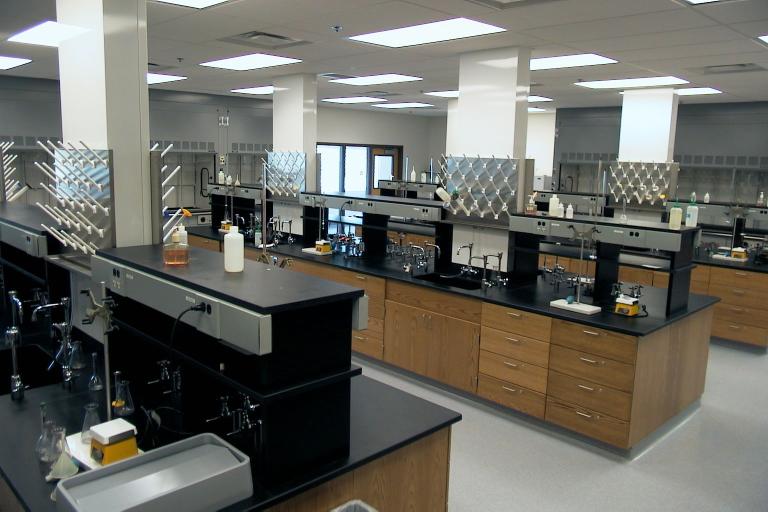
“Our department is very lab-intensive. The students are still getting the same experience and are reaching the same characterizations and conclusions.”
Lab manager Jennifer Rivet and Lab specialist Michael Stogsdill are on a mission to reduce hazardous and toxic wastes in the Chemistry and Biochemistry department to help create more environmentally friendly lab practices on campus. They are achieving a more sustainable campus by reducing the overall quantity of waste, altering the types of waste created and creating better practices to separate hazardous materials.
“We are doing a good job of limiting the quantity of waste that we are producing,” Rivet said. “We are working with faculty to see if we can focus on micro-scale experiments rather than macro-scale. In some cases we’ve been able to change lab options completely to further minimize waste.”
Reducing hazardous wastes in labs is a priority for Kettering lab technicians.
Despite changing the scale at which labs are conducted, the learning environment for students has not changed.
“Our department is very lab-intensive. The students are still getting the same experience and are reaching the same characterizations and conclusions,” Rivet said. “They still do the same lab, it’s just smaller.”
Reducing chemical waste has many implications. Less waste creation means less materials to dispose of, less hazardous substances in the environment and reduced costs associated with disposal for each department. Also, the reduction in hazardous chemicals also means a safer working environment for faculty and students.
“We’ve been focusing on teaching safe chemical practices,” Rivet said. “We have also been examining our inventory and getting rid of items that are potentially dangerous and not being used in our labs. We are making our department safer.”
The department is partnered with the Environmental Quality Company to develop processes for waste separation within the laboratories which further reduces costs of disposable. As a result, the waste containers for metals in the laboratories have been reduced from 5-gallon sizes to just half-gallons based on a process that stores waste for each specific lab being conducted rather than en masse. This also provides Kettering students with an additional learning opportunity.
“There’s more organization of waste than we’ve had in our previous years,” Rivet said. “Now students are learning how waste needs to be separated along with conducting the experiments.”
Reducing waste on campus is a collaborative effort between faculty, staff and students. Each of the invested groups are working together to reduce waste for the greater good of campus and environment.
“It’s a joint project between the faculty, Michael and I,” Rivet said. “It’s a responsibility. We should be more environmentally friendly.”